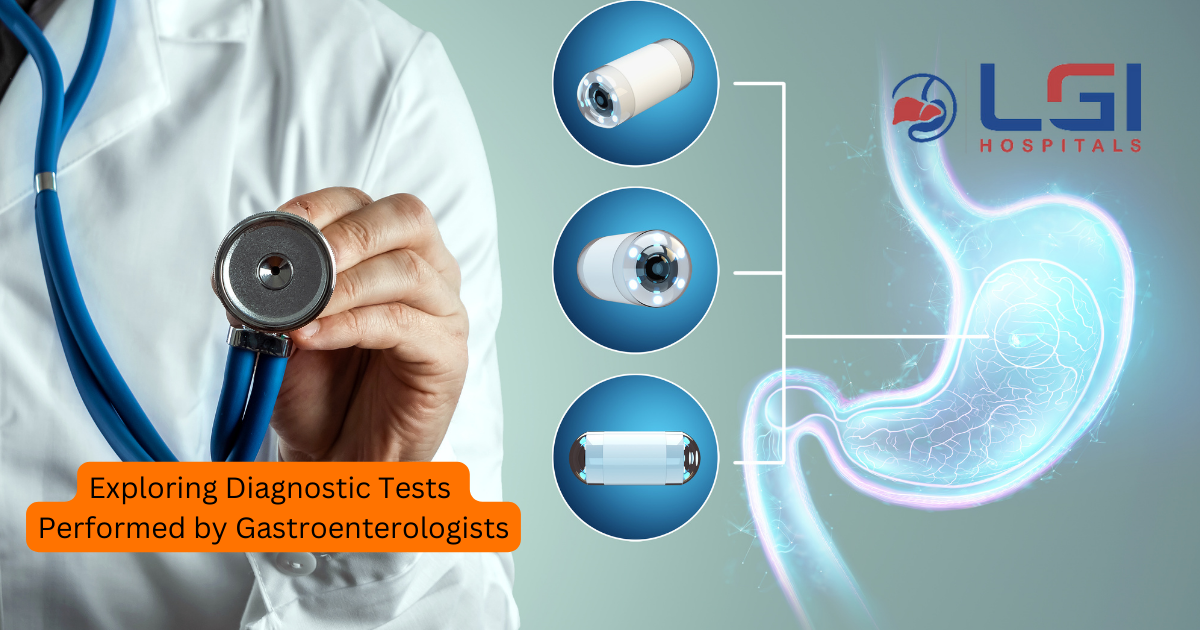Gastroenterologists are medical specialists who focus on diagnosing and treating diseases and disorders of the gastrointestinal (GI) tract. When patients present with symptoms related to the digestive system, gastroenterologists utilize various diagnostic tests to identify the underlying condition accurately. This blog post will explore some of the standard diagnostic tests performed by gastroenterologists, their purposes, and what patients can expect during the testing process. You can have a consultation at LGI Hospitals, Nagpur.
1. Endoscopy Procedures
Gastroenterologists commonly use endoscopy procedures to visualize and evaluate the GI tract. There are several types of endoscopy procedures, including:
a. Upper Endoscopy (Esophagogastroduodenoscopy or EGD)
An upper endoscopy involves the insertion of a thin, flexible tube with a light and camera (endoscope) down the throat to examine the esophagus, stomach, and the first part of the small intestine (duodenum). This procedure is typically performed to investigate symptoms such as difficulty swallowing, heartburn, and abdominal pain or to screen for conditions like ulcers, inflammation, or tumors.
b. Colonoscopy
Colonoscopy is a procedure in which a flexible tube with a camera (colonoscope) is inserted into the rectum to examine the entire colon. This test is commonly used for screening and diagnosing conditions such as colon polyps, colorectal cancer, inflammatory bowel disease, and diverticulosis. Polyps or abnormal tissue can be removed or biopsied during the procedure for further evaluation.
c. Endoscopic Retrograde Cholangiopancreatography (ERCP)
ERCP is a specialized endoscopic procedure used to diagnose and treat conditions affecting the bile ducts and the pancreas. It involves the insertion of an endoscope through the mouth and into the small intestine to access the bile and pancreatic ducts. ERCP can help diagnose and treat conditions such as gallstones, bile duct strictures, tumors, and pancreatitis.
d. Endoscopic Ultrasound (EUS)
Endoscopic Ultrasound combines endoscopy with ultrasound technology to obtain detailed images of the digestive tract and surrounding structures. EUS is commonly used for evaluating gastrointestinal tumors, staging cancers, and assessing lymph nodes. EUS can also obtain fine-needle aspiration (FNA) samples for biopsy purposes.
2. Imaging Studies
In addition to endoscopy procedures, gastroenterologists may order imaging studies to obtain detailed images of the GI tract or other abdominal structures. Some of the standard imaging tests used include:
a. X-Ray
X-rays of the abdomen or gastrointestinal series may be performed to evaluate the structure and function of the digestive system. This test can help identify blockages, strictures, or abnormalities in the GI tract.
b. Computed Tomography (CT) Scan
A CT scan uses X-rays and computer technology to create detailed cross-sectional images of the abdomen and pelvis. It can provide information about tumors, abscesses, inflammation, or other abnormalities in the GI tract or surrounding structures.
c. Magnetic Resonance Imaging (MRI)
MRI uses powerful magnets and radio waves to generate detailed images of the abdomen and pelvis. It can provide valuable information about the liver, gallbladder, bile ducts, pancreas, and other abdominal organs. MRCP (Magnetic Resonance Cholangiopancreatography) is a specialized MRI technique that studies the bile and pancreatic ducts.
d. Ultrasound
Abdominal Ultrasound uses high-frequency sound waves to create images of the organs in the abdomen. Ultrasound is commonly used to evaluate the liver, gallbladder, pancreas, and other abdominal organs. Endoscopic Ultrasound, as mentioned earlier, combines endoscopy with ultrasound technology to provide detailed images of the digestive tract and surrounding structures.
3. Laboratory Tests
Gastroenterologists often order laboratory tests to assess various aspects of gastrointestinal health. These tests may include:
a. Blood Tests
Blood tests can provide valuable information about liver function, pancreatic enzymes, inflammation markers, nutritional status, and the presence of specific antibodies associated with autoimmune gastrointestinal diseases.
b. Stool Tests
Stool tests, such as fecal occult blood tests, stool cultures, or tests for parasites, may be ordered to assess for gastrointestinal bleeding, infections, or other abnormalities.
c. Breath Tests
Breath tests can help diagnose conditions such as lactose intolerance, bacterial overgrowth in the small intestine, or Helicobacter pylori infection, a common cause of peptic ulcers.
4. Other Diagnostic Procedures
In addition to the tests mentioned above, gastroenterologists may perform other diagnostic procedures based on specific patient needs. These may include:
a. Manometry
Esophageal Manometry measures the strength and coordination of the muscles in the esophagus, helping diagnose conditions such as achalasia or gastroesophageal reflux disease (GERD).
b. pH Monitoring
pH monitoring assesses the amount of acid reflux into the esophagus over 24 hours. It can help diagnose GERD or laryngopharyngeal reflux (LPR).
c. Capsule Endoscopy
Capsule endoscopy involves swallowing a small capsule that contains a camera, which captures images of the digestive tract as it travels through the body. It helps evaluate the small intestine and diagnose conditions such as bleeding, Crohn’s disease, or tumors.
Conclusion
Gastroenterologists employ a variety of diagnostic tests to evaluate and diagnose conditions affecting the gastrointestinal system. The choice of tests depends on the patient’s symptoms, medical history, and suspected conditions. It is essential to consult with a gastroenterologist or healthcare professional to determine the appropriate testing required for accurate diagnosis and effective treatment. These diagnostic tests enable gastroenterologists to provide targeted care and develop personalized treatment plans for their patients, ultimately improving outcomes and promoting gastrointestinal health. Get your consultation at LGI Hospitals, Nagpur.

